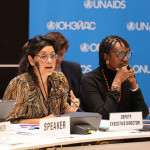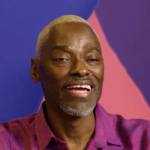The first time I saw Love! Valour! Compassion! I was working as a staff attorney at Gay Men’s Health Crisis. We took a group of clients — all living with HIV/AIDS — to see the play. I remember one of my clients spontaneously grabbing my arm as we laughed and cried our way through the three cathartic acts. There was a particular scene that is permanently etched in my memory.
The character Buzz, played by the incomparable Nathan Lane, is falling in love with James, played by John Glover, who won a Tony for his performance. Both characters are HIV positive and hadn’t expected to find themselves falling in love at this stage in their lives. James had a Kaposi’s sarcoma lesion on his chest, which he revealed to Buzz. In a moment of profound simplicity, Buzz asks James if he can kiss it. And then, on a Broadway stage — at the height of the pandemic — one man gently kissed another man’s lesion. The audience gasped at the sheer bravery and power of this theatrical moment — a stage moment I will never forget.
My client, whose body was covered in lesions, squeezed my arm tight at that moment, as if to say — “That’s me on that stage, that’s my life. I’ve been robbed of that dignity.” It was a moment of extraordinary beauty. KS lesions were a common sight at that time and society did its best to treat people with HIV as outcasts — people to be feared; people unworthy of our care and certainly not capable of finding love.
But Terrence McNally saw it otherwise. Terrence created two characters capable of finding love — two characters deserving of love. Two men who were worthy of dignity and respect. Perhaps most significantly, Terrence challenged society’s irrational fears and disarmed the audience with a moment of profound intimacy. It was one of the most powerful moments I have ever experienced in a theatre. At the time I had not met the playwright but I think I fell in love with him that day — his expressions of love, valour and compassion became so deeply seared into my soul.
That was a Thursday night in 1995. I saw the play three more times during its Broadway run and never imagined that I would meet, let alone marry, its author — but indeed that’s what happened.
I met Terrence six years later, when I produced a panel entitled “Theatre From a Gay Perspective.” Terrence had lost two partners to AIDS — the actor/director Robert Drivas and the playwright/activist Gary Bonasorte. I had worked full time for more than a decade providing free legal services to low income people living with HIV/AIDS, primarily in the Bronx, when we met. On our first date we talked for hours about social justice and the impact HIV had on our lives — about the relationship between class, race and sexuality and the ways in which the lives of people with HIV had been treated as expendable. It was our conversation that night that laid the foundation for our relationship.
Terrence wrote fearlessly about HIV and AIDS. He had no patience for artists who chose to ignore the disease that was ravaging our community. He thought the closet was murderous and artistic indifference was immoral. Indeed, Terrence thought it was a sin not to write about AIDS — and so he wrote passionate plays that challenged the world to respond to HIV with love and action. It is a point of great personal pride to me that Terrence never stopped writing about HIV, even when it seemed to some less fashionable to do so.
Terrence’s plays ran the gamut of emotions and perspectives. Whether it was Andre’s Mother, where Terrence explored a mother’s pain as she couldn’t accept her son’s sexuality or the cause of his death; or Mothers and Sons, when some 20 years later he brought that same character back to examine the stultifying effect that having rejected her son had on the rest of her life. But in the latter play, Terrence also went searching for forgiveness and hope — recognizing the self-inflicted wounds of parents who lost their children before it was too late to tell them they loved them and perhaps providing a roadmap to enlightenment for those parents who were entrapped by their own homophobia.
In The Lisbon Traviata Terrence explored the deep and harmful impact that came from fear of intimacy in the face of HIV and in Lips Together, Teeth Apart Terrence found a way to look at AIDS through the prism of a pair of straight couples on Fire Island whose irrational fear of transmission and homophobia deprived them of the joy of sibling love and community. From Frankie and Johnny to Some Men to Some Christmas Letters, Terrence wrote about HIV.
He was a truth teller. He was a believer in community. He was unapologetic in his outrage at government inaction and society’s indifference to people living with HIV. In Corpus Christi, he exposed religious hypocrisy and made plain his belief that the queer community had a rightful place at the table of faith. More pointedly, in his telling, ministering to people with HIV and AIDS was a moral obligation and the only legitimate response to anyone claiming a spiritual path.
When Terrence died from complications related to COVID, it was not lost on me that a pandemic fueled by government ineptitude took him from us. I have struggled to reconcile the pain of losing him with how he died. I often wonder what he would be writing right now. I know he would be writing about HIV and COVID and the importance of human connection. He would be teaching us about kindness and artistic integrity. He would be reminding us that art has the capacity to change lives; to galvanize; to humanize; to hold us accountable. He would be connecting the dots of history and showing us a way forward. He would be imploring the next generation of writers to expose a society that relegates queer and BIPOC folx to second class citizenship. He would rage at a society that acquits Kyle Rittenhouse when George Floyd and Breonna Taylor can be murdered in cold blood. He would recognize the relationship between systemic racism, transphobia, homophobia and the continued spread of HIV. He would not be writing about COVID at the expense of HIV/AIDS. He would be reminding us that we forget history at our peril — that they are related.
I know he would be writing about long term survivors and the fact that the pandemic of HIV is not over. Indeed, he would be demanding that we never forget.
I mentioned earlier that I worked providing free legal services to people with HIV/AIDS for many, many years. It was those years spent in hospitals that prepared me for when Terrence passed on March 24, 2020 — early days in the COVID pandemic. I was able to be with Terrence when he died — fully suited up in my protective gear, just as I had done in the very early days of HIV. At the end of his life, I was reminded of the painful and healing ways that life can imitate art. In Love! Valour! Compassion!, Buzz says to his best friend Perry: “Can you promise me you’ll be holding my hand when I let go?”
Near the end of his life, I made that same promise to Terrence. It’s a promise I kept. As I held his hand in the hospital while he lay on the respirator, I asked him to squeeze my hand. I needed him to know I was there. Right on cue, he squeezed my hand tightly. In that moment I knew it was time to say goodbye — that he was ready and at peace. I told him he helped remind the world what truth and beauty and kindness are. That he made the world a better, safer place.
I am so thankful that I have his words — his beautiful, funny, passionate, rageful, loving words to inspire me to keep fighting. Let the red ribbon remind us of our obligation to keep agitating for change; to keep alive the memories of those lost to AIDS; to never forget the long-term survivors who need our help and support; and to remind future generations that there is a better, more humane path forward.
Tom Kirdahy is a Tony-winning theatrical producer, lawyer and activist. His remarks were given at Playbill’s live concert Remember the Ribbon: A Tribute to World AIDS Day, which took place Sunday, November 20, 2021. Gilead Sciences was the premier sponsor. To read more about the event, click here.







1 Comment
1 Comment